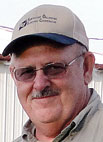 A rather common sight on the outskirts of Miami, Okla., is a herd of goats charging out of a pasture into the front and side yards of Richard and Cherrie Fry’s. No dog is outside to round up the goats and bring them back to the pasture. All that can be seen is a couple standing near the charging goats with long, flexible fiberglass poles in their hands. The goats soon stop and start munching on grass in the side yard. The couple then walks among them, petting them, talking to them and gently herding them to different parts of the yard. The goats never stray near the busy road in front.
A rather common sight on the outskirts of Miami, Okla., is a herd of goats charging out of a pasture into the front and side yards of Richard and Cherrie Fry’s. No dog is outside to round up the goats and bring them back to the pasture. All that can be seen is a couple standing near the charging goats with long, flexible fiberglass poles in their hands. The goats soon stop and start munching on grass in the side yard. The couple then walks among them, petting them, talking to them and gently herding them to different parts of the yard. The goats never stray near the busy road in front.
Richard and Sherry Fry own 14 acres and 58 Boer goats. Sherry grew up on a farm and wanted goats but Richard was very hesitant because he had sheep in his past and didn’t want to get back into all of that work. Cherrie, however, soon won out, and the couple bought six goats in 2006. Cherrie grinned and said, “Richard thought I’d give up, but he was wrong.” Richard then admitted he wasn’t the least bit sorry. He said he soon discovered the goats were not at all like sheep and were more like pets because they were so social and easy to handle. He said, “They are trainable and like a lot of attention. Sherry has named them all and knows each one by sight. If you call a name, that goat looks at you.”
Pets or not, the goats are still a business. The kids are born in November and December and sold in May so they are ready for livestock shows in the spring. Generally, goats have to win in a spring show to be eligible to show in the fall. The couple really enjoys when children come out to select kids for showing. Their customer base comes from word-of-mouth advertising and from people passing by who see the goats milling in the yard every other day.
Because of the size of the operation, genetics have to be handled carefully. Cherrie usually keeps a registered billy for three years and then changes to prevent inbreeding. When selecting a billy, Cherrie looks mainly for body structure. She then saves the nannies and sells the billies. Their current registered billy is from South Africa.
Cherrie said her biggest challenge is finding a vet who understands goats. She said “I have to pretty much be my own vet. I have a water treatment plan four days in a row once a year, which I have learned through a lot of trial and error. I deworm the goats as needed, so they don’t become immune to the drugs. One of the advantages of goats is that they have such a high immune systems.”
The last two years pasturing has been supplemented with hay because of the dry weather. The goats also get grain in the winter with a custom mix of corn, oats, barley, molasses and sometimes minerals. A mineral block is also available to them. Cherrie said, “We can’t fatten them as much as we used to because of the price of feed, but they also have to be a certain weight for showing so we have to balance what we do.” Richard disagreed, “This is not a moneymaking proposition because she won’t take any shortcuts. They are fatter than dog ticks.”
Cherrie was raised on a farm with older brothers so she was a tomboy. Richard, on the other hand, was from town. However, both enjoyed the outdoors and hunting and fishing though Richard won’t eat what he hunts and gives much of the meat away. Now they enjoy their goats together and helping on her family’s pecan farm. Richard works for Newell Coach which makes Class A motor homes that start at $1 million and are often built for NASCAR drivers.







